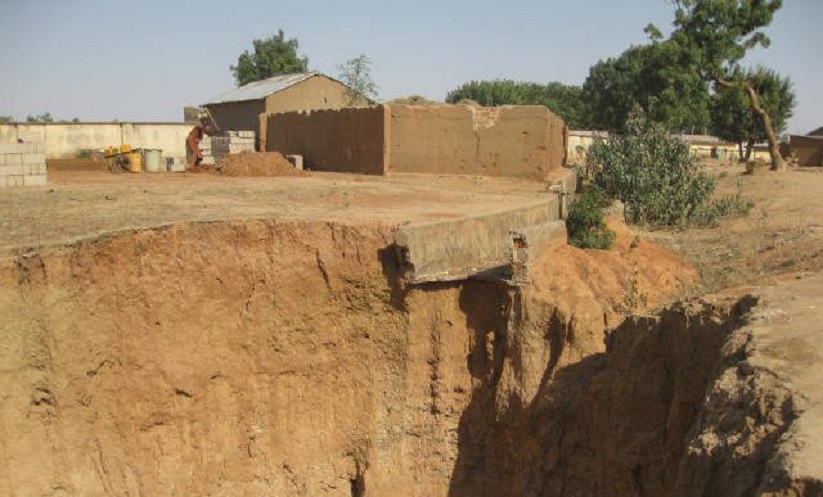General
Buhari Gets Ultimatum to Probe Spending of Ecological Fund

By Adedapo Adesanya
President Muhammadu Buhari has been given a deadline by the Socio-Economic Rights and Accountability Project (SERAP) to investigate the spending of Ecological Fund by governments at all levels—federal, state and local- from 2001 to date.
In a letter dated October 22, 2022, the group asked Mr Buhari to direct the Attorney General of the Federation and Minister of Justice, Mr Abubakar Malami, and the appropriate anti-corruption agencies to look into how the funds have been spent for the last 21 years within seven days.
This became imperative following the ravaging floods in most states of the federation, which have claimed more than 600 lives and have rendered many homeless.
SERAP said it was worried that the huge amount of money released to state and local governments to tackle this issue had been squandered by officials.
The organisation wants “suspected perpetrators of corruption and mismanagement [to] face prosecution as appropriate, if there is sufficient admissible evidence, and any missing public funds should be fully recovered.”
In the open letter signed by its deputy director, Mr Kolawole Oluwadare, the organisation said: “trillions of ecological funds have allegedly gone down the drain. The resulting human costs directly threaten human rights – rights to life and to a place to live – rights that your government has an obligation to protect.”
The rights body said, “Irrespective of the cause of a threat to human rights, your government still has positive obligations to use all the means within its disposal to uphold the human rights of those affected.”
SERAP also said, “Although ecological funds are shared across the three tiers of government and emergency management agencies, the funds are managed and supervised by the Federal Government.”
It reminded Mr Buhari that his “government has the legal obligations to hold all tiers of government and emergency management agencies to account, and to trace, find, and recover any missing ecological funds.”
“Your government has the legal obligations to address the calamitous consequences of flooding for the human rights of millions of people and to prevent and address some of the direst consequences that climate change may reap on human rights, especially given the disproportionate impact on vulnerable people and communities.
“Your government must use all means available to it to prevent and address the threats to human rights that result from climate change and to provide access to effective remedies for victims when these rights are violated.
“Your government has a positive obligation to protect individuals against the threat posed to human rights by climate change, regardless of the causes.
“Your government also has legal obligations to effectively address the aftermath of the flooding, such as deterioration in health, diminishing access to safe drinking water and susceptibility of the areas affected to disease.
“We would be grateful if the recommended measures are taken within seven days of the receipt and/or publication of this letter. If we have not heard from you by then, SERAP shall consider appropriate legal actions to compel your government to comply with our request in the public interest.
“Climate change also has the potential to exacerbate existing threats to human rights in the country. Rising global temperatures will jeopardise many people’s livelihoods, increasing their vulnerability to poverty and social deprivation.
“In order to uphold its constitutional and international human rights obligations, your government must respond to the impacts of the flooding and of climate change generally.
“According to the audit of the Ecological Fund Office carried out by the Nigeria Extractive Industries Transparency Initiative (NEITI), the total amount allocated and received by the fund from December 2011 to November 2016 was N277 billion.
“The operations of the Fund from 2012 to 2016 reportedly showed that some of the disbursements were not utilised for the purpose for which it was established. During these periods, N74,170,932,645.20 was released to State Governments to solve ecological problems in their states.
“Impunity for corruption in the management of Ecological Fund will continue as long as high-ranking public officials go largely unpunished for their alleged crimes. By pursuing these allegations and taking the evidence before the court, the truth will be revealed and justice best served.
“SERAP is seriously concerned that years of allegations of corruption and mismanagement in the spending of Ecological Fund and entrenched impunity of perpetrators have undermined the ability of governments at all levels and emergency management agencies to prevent the impact of flooding on the human rights of socio-economically vulnerable Nigerians, and to respond to the problem effectively.
“Allegations of corruption and mismanagement have undermined the ability of authorities at all levels to invest in drainage systems and to tackle soil erosion and climate change challenges across several parts of the country.
“SERAP also urges you to direct Mr Malami and appropriate anti-corruption agencies to urgently identify and ensure access to justice and effective remedies to affected victims,” it said.
“SERAP also urges you to direct Boss Mustapha, Secretary to the Federal Government to publish details of allocations from the Ecological Fund to the Federal Government, the 36 state governments, Abuja, the 774 local government areas of the country, and the National Emergency Management Agency, as well as state emergency management agencies between 2001 to date.
“SERAP urges you to instruct the Economic and Financial Crimes Commission (EFCC) and Independent Corrupt Practices and Other Related Offences Commission (ICPC) to jointly track and monitor the spending of Ecological Fund by the 36 state governors, the 774 local government areas, as well as all emergency management agencies across the country funded through the Ecological Fund.
“SERAP is concerned that the funds released for ecological projects are characterised by mismanagement, diversion of funds, substandard and abandoned projects fully paid for. Ecological funds have also been allegedly spent for other purposes, such as election campaigns and political patronage.
“Prevention of corruption in the spending of Ecological Fund, and preventing and addressing the challenges caused by climate change are serious and legitimate public interests.
“There is a legitimate public interest in ensuring justice and accountability for alleged corruption and mismanagement in the management of Ecological Fund.
“Nigerians have the right to know how the public funds budgeted to address ecological challenges are spent. Publishing the details of allocations of Ecological Fund since 2001 would promote transparency, accountability, and reduce the risks of corruption in the spending of the funds,” SERAP added.
General
NCC Arraigns Netnaija’s Emma Analike Over Alleged Copyright Infringement

By Modupe Gbadeyanka
The chief executive of Netnaija Media Enterprises, Mr Emmanuel Analike, has been arraigned before a Federal High Court sitting in Abuja by the Nigerian Copyright Commission (NCC).
The suspect appeared before Justice Suleiman Liman on Wednesday over allegations bordering on copyright infringement.
He was accused by the NCC of using his online platform to make movies and others not belonging to him available for users to download on the internet.
According to the agency, Mr Analike has infringed copies of audio-visual materials distributed online via his website for online users. Netnaija is an online movie and music download site.
The prosecution counsel, Ms Gladys Isaac-Ojo, who works with the NCC, told the court that the defendant committed an offence contrary to and punishable under Section 44 (1) (a) of the Copyright Act, 2022.
However, Mr Analike pleaded not guilty to the charges preferred against him, prompting his counsel, Nnemeka Ejiofor, seek his bail.
The lawyer informed the court that the application was filed on Monday and supported by 23 paragraphs of affidavits and a written address.
But the judge refused to give a bench ruling and adjourned the ruling of the bail application to Monday, March 9, 2026, ordering the remand of the Netnaija chief in Kuje Correctional Centre.
General
Entries Open for ClimateLaunchpad Green Business Ideas Competition

By Modupe Gbadeyanka
Entries for the 2026 edition of the world’s largest green business ideas competition, ClimateLaunchpad, have opened.
In 2025, the programme, organised by Climate KIC, received over 2,700 applications from 40 countries. The winning ventures gain prize money, investor connections, and access to a global cleantech network.
This year’s edition is expected to be bigger and better, with climate innovators, green venture builders, and entrepreneurs from around the world given the opportunity to apply.
Since its inception in 2014, the programme has supported nearly 5,000 ideas across 97 countries, and this year, it is expanding its presence in Asia with Singapore hosting both the regional final and global grand final for the first time.
Participants move through several stages, including an initial mini-course to refine the concept, an intensive multi-day Boot Camp led by expert trainers, targeted coaching to perfect value propositions and investor pitches, national and regional finals, and a place at the global grand final, with prizes and access to a global climate network.
“Strengthening ClimateLaunchpad’s presence in Asia marks a profound new chapter for this programme and for the climate innovation movement more broadly. Asia is where so much of the world’s climate and nature future will be shaped, through business leadership, public-private partnerships and long-term strategic thinking,” the chief executive of Climate KIC, Kirsten Dunlop, stated.
“We look forward to supporting this momentum with new business ideas and innovation ecosystem collaborations across more than a dozen countries.
“This expansion opens space for deeper cross-cultural connections and for first-time founders to turn sparks of imagination into solutions that serve both people and planet,” Dunlop added.
Also commenting, the chief executive of Better Earth Ventures, Ms Rebecca Sharpe, said, “We are proud to host ClimateLaunchpad’s regional and global grand final in Singapore and to convene an international group of climate entrepreneurs from more than 50 countries.
“Climate solutions are emerging from every corner of the world, and bringing them together creates the kind of cross-border exchange and collaboration this moment demands. Our focus is to ensure early-stage founders have the structure, ecosystem access and support needed to move from idea to credible impact.”
General
Nigeria Okays Alphanumeric Digital Postcode System to Boost Delivery

By Adedapo Adesanya
Nigeria has finally approved the use of an alphanumeric digital postcode system for the country, 17 years after it was first considered.
According to the Minister of Communications and Digital Economy, Mr Bosun Tijani, the system was okayed at the Federal Executive Council (FEC) meeting on Wednesday, chaired by President Bola Tinubu, in line with the ministry’s strategic blueprint.
He said working in collaboration with the Nigerian Postal Service (NIPOST), the ministry will introduce a modern, geospatially intelligent addressing system that improves accuracy across the country and enables faster and more reliable mail and parcel processing.
“Beyond strengthening postal operations, the Digital Postcode System will also serve as an important national enabler supporting better national planning, improved emergency response, more efficient logistics and e-commerce, and the delivery of government services.
“As our digital economy continues to grow, foundational systems such as this play an essential role in building the infrastructure required to connect people, businesses, and services more efficiently across the country,” he said.
He noted that the approval represents another step forward in the Mr Tinubu-led administration’s commitment to building the enabling environment to support a modern, inclusive, and globally competitive digital economy.
On her part, Ms Tola Odeyemi, the Post Master General and chief executive officer of NIPOST, said the implementation is a foundational step toward building the digital infrastructure required for a modern economy.
“First conceptualised in 2009, this initiative is finally becoming a reality in 2026 under the leadership of President Bola Tinubu and the Minister of Communications, Innovation and Digital Economy, Dr Bosun Tijani,” she wrote on X, formerly Twitter.
“A digital postcode system is more than a postal reform. It is critical national infrastructure that enables e-commerce, logistics, emergency services, financial inclusion, security, urban planning, and effective public service delivery,” she added.
By introducing an alphanumeric addressing framework, Nigeria will now be able to identify locations with far greater precision across cities, towns, and rural communities.
“This will significantly improve how goods, services, and digital platforms reach Nigerians everywhere.
“This milestone reflects a shared commitment by the Federal Government to strengthen Nigeria’s digital backbone and unlock new opportunities for innovation, commerce, and national development,” she further stated.
-

 Feature/OPED6 years ago
Feature/OPED6 years agoDavos was Different this year
-
Travel/Tourism10 years ago
Lagos Seals Western Lodge Hotel In Ikorodu
-

 Showbiz3 years ago
Showbiz3 years agoEstranged Lover Releases Videos of Empress Njamah Bathing
-

 Banking8 years ago
Banking8 years agoSort Codes of GTBank Branches in Nigeria
-

 Economy3 years ago
Economy3 years agoSubsidy Removal: CNG at N130 Per Litre Cheaper Than Petrol—IPMAN
-

 Banking3 years ago
Banking3 years agoSort Codes of UBA Branches in Nigeria
-

 Banking3 years ago
Banking3 years agoFirst Bank Announces Planned Downtime
-

 Sports3 years ago
Sports3 years agoHighest Paid Nigerian Footballer – How Much Do Nigerian Footballers Earn












